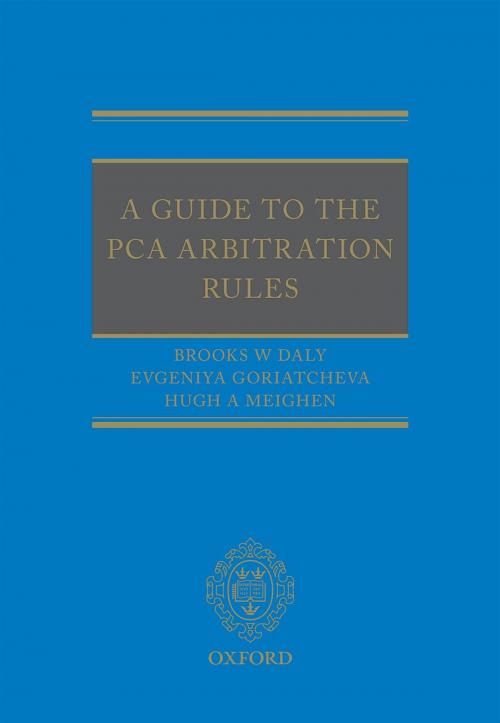A Guide to the PCA Arbitration Rules
Nonfiction, Reference & Language, Law, Arbitration, Negotiation, & Mediation, Courts| Author: | Brooks Daly, Evgeniya Goriatcheva, Hugh Meighen | ISBN: | 9780191502002 |
| Publisher: | OUP Oxford | Publication: | March 13, 2014 |
| Imprint: | OUP Oxford | Language: | English |
| Author: | Brooks Daly, Evgeniya Goriatcheva, Hugh Meighen |
| ISBN: | 9780191502002 |
| Publisher: | OUP Oxford |
| Publication: | March 13, 2014 |
| Imprint: | OUP Oxford |
| Language: | English |
This is a guide to and commentary on the new procedural rules for arbitration adopted by the Permanent Court of Arbitration (PCA) in December 2012. The PCA is a unique arbitral institution - an intergovernmental organization counting over one hundred member states - with a rapidly growing annual caseload of arbitrations involving various combinations of states, state entities, intergovernmental organizations, and private parties. The 2012 PCA Rules are the most recent set of arbitral rules from any institution, and constitute a consolidation of four sets of PCA Rules drafted in the 1990s, and updated in light of PCA experience and the revision of other procedural regimes. They include special provisions adapted to arbitrations involving public entities and a number of novel provisions drafted on the basis of the PCA's experience administering arbitrations. In recent years, the PCA caseload has expanded to the extent that the total amount in dispute in PCA cases is estimated to be greater than that in any other arbitral institution, increasing the need for a comprehensive guide to arbitration under its auspices. This text benefits from the unparalleled insights of its three co-authors, all of whom are PCA lawyers, one of whom is the Deputy Secretary-General of the PCA, and a member of the drafting committee for the 2012 PCA Rules. An introductory chapter, describing the mandate for the revised rules from the PCA member states, as well as the drafting process itself, is followed by a rule-by-rule analysis following the familiar structure of the rules themselves. This analysis is split into four sections: the introductory rules; the composition of the arbitral tribunal; arbitral proceedings; and the award. The comprehensive appendices are intended to reduce the need for recourse to other materials and provide a stand-alone resource.
This is a guide to and commentary on the new procedural rules for arbitration adopted by the Permanent Court of Arbitration (PCA) in December 2012. The PCA is a unique arbitral institution - an intergovernmental organization counting over one hundred member states - with a rapidly growing annual caseload of arbitrations involving various combinations of states, state entities, intergovernmental organizations, and private parties. The 2012 PCA Rules are the most recent set of arbitral rules from any institution, and constitute a consolidation of four sets of PCA Rules drafted in the 1990s, and updated in light of PCA experience and the revision of other procedural regimes. They include special provisions adapted to arbitrations involving public entities and a number of novel provisions drafted on the basis of the PCA's experience administering arbitrations. In recent years, the PCA caseload has expanded to the extent that the total amount in dispute in PCA cases is estimated to be greater than that in any other arbitral institution, increasing the need for a comprehensive guide to arbitration under its auspices. This text benefits from the unparalleled insights of its three co-authors, all of whom are PCA lawyers, one of whom is the Deputy Secretary-General of the PCA, and a member of the drafting committee for the 2012 PCA Rules. An introductory chapter, describing the mandate for the revised rules from the PCA member states, as well as the drafting process itself, is followed by a rule-by-rule analysis following the familiar structure of the rules themselves. This analysis is split into four sections: the introductory rules; the composition of the arbitral tribunal; arbitral proceedings; and the award. The comprehensive appendices are intended to reduce the need for recourse to other materials and provide a stand-alone resource.















